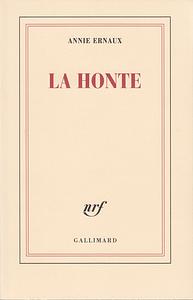Take a photo of a barcode or cover
emotional
reflective
sad
tense
medium-paced
emotional
reflective
sad
tense
Ernaux.🤯
She splits the seam between memory and identity.
One moment: her father tries to kill her mother.
One moment, and everything she thought she knew about her life, and herself, begins to unravel.
Ernaux doesn’t write memoirs in the way we think of memoirs.
She writes as if truth itself were on the autopsy table. Shame is short, yes, but it’s brutal in its precision.
She’s not after catharsis.
She’s after clarity.
And she makes you feel the cost of that clarity in your body.
She doesn’t rehash the traumatic event.
That’s not the point.
The point is what happened after…the unspeakable silence, the bodily inheritance of shame, and the way that moment tore the thread between the girl she was and the woman she would become.
That’s the seam I’m talking about: the one that connects memory to identity.
Once it rips, you’re no longer just you.
You’re also the watcher, the holder of secrets, the one who sees too much and says too little.
The shame isn’t just about what happened.
It’s about what it did to her sense of self, how it contaminated her relationship to class, to religion, to her body, and to her parents, who, suddenly, seemed foreign, grotesque, broken.
“I was no longer in the world. I was outside it,” she writes.
And you feel that exile.
This is trauma written in x-ray.
Her style is unsentimental, exacting, almost surgical.
She dissects experience rather than embellishes it.
She tells the truth, not to heal, but to witness.
To not look away.
And because she doesn’t look away, we can’t either.
I underlined whole pages. I kept whispering, “yes, that.”
And when I closed the book, I felt that familiar Ernaux ache: of being gutted, clarified, and slightly more awake.
I am aware, this will take numerous re-reads to fully grasp.
If you’ve ever looked back on your younger self and wanted both to hug her and apologize, this book is for you.
If you want literature that tells the truth without flinching, read Ernaux.
Read Shame.
She splits the seam between memory and identity.
One moment: her father tries to kill her mother.
One moment, and everything she thought she knew about her life, and herself, begins to unravel.
Ernaux doesn’t write memoirs in the way we think of memoirs.
She writes as if truth itself were on the autopsy table. Shame is short, yes, but it’s brutal in its precision.
She’s not after catharsis.
She’s after clarity.
And she makes you feel the cost of that clarity in your body.
She doesn’t rehash the traumatic event.
That’s not the point.
The point is what happened after…the unspeakable silence, the bodily inheritance of shame, and the way that moment tore the thread between the girl she was and the woman she would become.
That’s the seam I’m talking about: the one that connects memory to identity.
Once it rips, you’re no longer just you.
You’re also the watcher, the holder of secrets, the one who sees too much and says too little.
The shame isn’t just about what happened.
It’s about what it did to her sense of self, how it contaminated her relationship to class, to religion, to her body, and to her parents, who, suddenly, seemed foreign, grotesque, broken.
“I was no longer in the world. I was outside it,” she writes.
And you feel that exile.
This is trauma written in x-ray.
Her style is unsentimental, exacting, almost surgical.
She dissects experience rather than embellishes it.
She tells the truth, not to heal, but to witness.
To not look away.
And because she doesn’t look away, we can’t either.
I underlined whole pages. I kept whispering, “yes, that.”
And when I closed the book, I felt that familiar Ernaux ache: of being gutted, clarified, and slightly more awake.
I am aware, this will take numerous re-reads to fully grasp.
If you’ve ever looked back on your younger self and wanted both to hug her and apologize, this book is for you.
If you want literature that tells the truth without flinching, read Ernaux.
Read Shame.
Sehr interessante Beobachtungen in einer Sprache, die Bilder heraufbeschwört
emotional
reflective
tense
emotional
reflective
sad
tense
slow-paced
slow-paced
reflective
fast-paced
emotional
reflective
slow-paced
reflective
slow-paced



